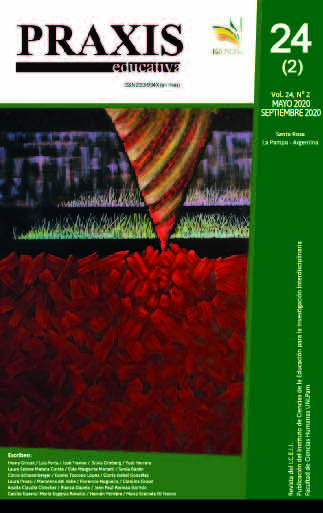Digital skills in middle and university students. Homogeneous or heterogeneous?
DOI:
https://doi.org/10.19137/DOI:%20https://dx.doi.org/10.19137/praxiseducativa-2020-240208Keywords:
digital skills, students, middle level, university, self-perceptionsAbstract
Today's work world demands a set of competencies that are key and highly valued, among them, digital skills. Within this framework, the paper presents data about the digital skills of current students. A total of 454 students from different university degrees (engineering, economics and humanities) and from a secondary school participated in the research. They responded to a questionnaire on ICT uses and self-perceptions of their digital competencies for the performance of activities that require the use of technology. The results show different levels of mastery (high, medium and low) with respect to 18 activities consulted. In the same way, 10 of the 18 activities showed differences when groups where compared. Engineering students generally
reported greater mastery. Discussion revolves around highlighting the importance of generating, from academic contexts, opportunities for the development of different digital skills.
Downloads
References
Área, M. y Pessoa, T. (2012). De lo sólido a lo líquido. Las nuevas alfabetizaciones ante los cambios culturales de la Web 2.0. Comunicar: Revista científica iberoamericana de comunicación y educación, 38, 13-20.
Recuperado de:https://www.revistacomunicar.com/pdf/preprint/38/01-PRE-12378.pdf
Área, M. (2011). ¿Qué es la competencia digital? [Archivo de video].Recuperado de:
https://www.youtube.com/watch?v=V_HOIsP-Ix8
Bennett, S. y Maton, K. (2010). Beyond the 'digital natives' debate: towards a more nuanced understanding of students' technology experiences. Journal of Computer Assisted Learning, 26(5), 321-331. Recuperado de:http://ro.uow.edu.au/cgi/viewcontent.cgi?article=2330&context=edupapers
Bossolasco, M. L., ChiecherA. C. y Dos Santos, D. (2020). Perfiles de acceso y apropiación de TIC en ingresantes universitarios. Estudio comparativo en dos universidades públicas argentinas. Pixel-Bit Revista de Medios y Educación, 57, 151-172. Recuperado
de:https://recyt.fecyt.es/index.php/pixel/article/view/72199/48044
Comisión Europea. (2007).Competencias clave para el aprendizaje permanente un marco de referencia europeo. Recuperado
de:https://www.educacionyfp.gob.es/dctm/ministerio/educacion/mecu/movilidadeuropa/ competenciasclave.pdf?documentId=0901e72b80685fb1
Chiecher, A.(2018).Competencias digitales de jóvenes que inician sus trayectorias universitarias ¿Desafíos para la docencia en la era digital?. Recuperado
Chiecher, A. (2019). Culturas juveniles y prácticas docentes ¿Sintonía o desajuste?. Conferencia presentada en el VIII Seminario Internacional de Educación a Distancia. Universidad Nacional de Jujuy, Tilcara.
Chiecher, A. y Riccetti, A. (2019). ¿Jugando con WhatsApp en la universidad? Habilidades y emociones frente a una tarea inusual. En P. Paoloni, M. C. Rinaudo y R. Martín (comps.), Yo, tu… ellos y nosotros .Competencias socioemocionales en la construcción de identidades profesionales (pp. 135- 150).Córdoba: Editorial Brujas.
Chiecher, A. y Melgar, M. F. (2018). ¿Lo saben todo? Innovaciones educativas orientadas a promover competencias digitales en universitarios. Revista Innovación Educativa, 10, 110-123. Recuperado
de:http://www.udgvirtual.udg.mx/apertura/index.php/apertura/article/view/1374
Ferrari, A. (2013). DIGCOMP. A framework for Developing and Understanding Digitals Competence in Europe.
Recuperado de:https://publications.jrc.ec.europa.eu/repository/bitstream/JRC83167/lb-na-26035- enn.pdf
Gallardo, E., Marqués, L. y Bullen, M. (2016). Hablemos de aprendices digitales en la era digital. Revista Mexicana de Bachillerato a Distancia, 8(15), 148-182. Recuperado
de:http://bdistancia.ecoesad.org.mx/?articulo=lets-talk-about-digital-learners-in-thedigital-era
Gisbert, M. y Esteve, F. (2011). Digital learners: la competencia digital de los estudiantes universitarios. La cuestión universitaria,7, 48-59. Recuperado
de:http://polired.upm.es/index.php/lacuestionuniversitaria/article/view/3359/3423
Gisbert, M., González, J. y Esteve, F. (2016). Competencia digital y competencia digital docente: una panorámica sobre el estado de la cuestión. RIITE. Revista Interuniversitaria de Investigación en Tecnología Educativa, 0, 74-83. DOI: http://dx.doi.org/10.6018/riite/2016/257631
Kennedy, G., Judd, T., Dalgarno, B. y Waycott, J. (2010). Beyond natives and immigrants: exploring types of net generation students. Journal of Computer Assisted Learning, 26, 332–343.
Morduchowizc, R. (2013). Los adolescentes del siglo XXI. Consumos culturales en un mundo de pantallas. Buenos Aires: Fondo de Cultura Económica.
Morduchowizc, R. (2016). Ruidos en la web. Cómo se informan los adolescentes en la era digital. Buenos Aires: Cúspide.
Paoloni, P. (2019). Competencias socio, emocionales antes, ahora ¿y mañana qué?. En P. Paoloni, M. C.
Rinaudo y R. Martín (comps.), Yo, tu… ellos y nosotros. Competencias socioemocionales en la construcción de identidades profesionales (pp. 103-134). Córdoba: Editorial Brujas.
Prensky, M. (2001). Digital natives, digital inmigrants. On the Horizon, 9(5), 1-6. Recuperado de:http://marcprensky.com/writing/Prensky%20-
%20Digital%20Natives,%20Digital%20Immigrants%20-%20Part1.pdf
Viñals Blanco, A. y Cuenca Amigo, J. (2016). El rol del docente en la era digital. Revista Interuniversitaria de Formación del Profesorado, 2(30), 103-114. Recuperado
Downloads
Published
Issue
Section
License
Copyright Notice
Editorial Committee Educational Praxis Magazine:
I hereby declare that I am the author of the article titled (article name), that it is original and my own and that it was not previously published in any other format or medium. I declare to know that the magazine will not charge me any type of fee under any circumstances, nor will I receive any type of monetary compensation If it were accepted for publication in Educational Praxis, I authorize the aforementioned magazine to publish it digitally and to advertise it on its social networks.
If the work is published, I adhere to the Creative Commons license called "Attribution - Non-Commercial Share Alike CC BY-NC-SA", through which it is allowed to copy, reproduce, distribute, publicly communicate the work and generate derivative works, as long as when the original author is cited and acknowledged. This license has been used since September 2018. In 2016 CC BY NC ND 4.0 was adhered to; and in the years 2017 and 2018 (January-August) CC BY NC 4.0.
This CC BY-NC-SA Share Alike license does not, however, permit commercial use of the work. As an author, the journal may establish additional agreements for the non-exclusive distribution of the version of the work published in the journal, it allows me to self-archive the published articles, in their post-print version, in institutional, thematic repositories, personal web pages or any other relevant use. with the recognition of having been first published in this journal.
Educational Praxis adheres to DORA (Declaration on Research Assessment) signed in San Francisco, California, on December 16, 2012, and to the Declaration of Mexico (Joint Declaration LATINDEX - REDALYC - CLACSO - IBICT).















_(1)2.png)


3.png)











_(2).png)






2.jpg)









